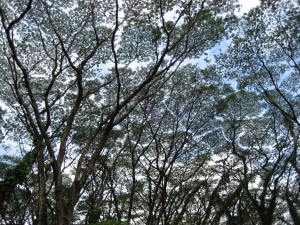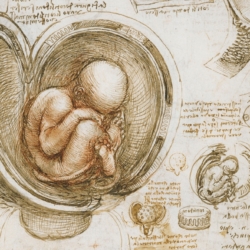| Contribute a translation | Source (English) |
|---|---|
The four teachings below are connected with the Four Worlds that the kabbalists saw as the architecture of the universe. When the Kabbalistic community of Tz’fat created the Seder for Tu BiShvat/Yah BiShvat, they unfolded these Four Worlds in four cups of wine and four sorts of fruit and nuts (one sort so ethereal it was invisible and untouchable). | |
The world of Asiyah (Physicality) | |
The Tu BiShvat seder itself is the one ceremonial meal that requires the death of no living creature. Trees give us nuts & fruit in such profusion that we can eat and eat without endangering the next generation. Even the Pesaḥ bitter herb requires yanking a radish up by the root. So the Tu BiShvat Seder is the meal of Gan Eden, the Garden of Delight. | |
The mixture of red wine and white in the four successive cups of the Seder is often described as a procession of the seasons, from white winter to the full red of autumn. It may also be an echo of the Rabbinic and Kabbalistic teaching that it is the mixture of blood (red) and semen (white) that makes the future fruitful. | |
The world of Yetzirah, Relationship | |
In the year 2000, for Tu BiShvat 300 Jews and people of other cultures and communities gathered in the redwood forests of northern California to challenge a corporation that was logging ancient redwoods, shattering the grandeur of groves that had been growing 1500 years and more that were growing when Shammai and Hillel first debated the date of the new year of the trees. | |
At the end of the Seder, we planned to walk onto ground that Maxxam Corporation had shattered in this way, and to plant redwood seedlings as an act of protest. Nonviolent civil disobedience. And we did. Though the company’s police were ready to arrest us, they pulled back at the last moment. | |
But first we sat nearby in a grove of ancient trees to share the Seder. Above us towered trees that were more than 200 feet tall — the tallest living beings on the planet. Suddenly my friend, student, co-editor, and teacher (now Rabbi) Naomi Mara Hyman turned to me and said, “Imagine if those 200-foot-tall eytzim (trees) were the eytzim (wooden poles) of a Sefer Torah! — What a Sefer Torah it would be, how large, not only physically but in the spirit! And we ourselves, we would each be just the right size to be a letter in that Sefer Torah!” | |
To which I would add this: We are of course the living letters of a living Sefer Torah, the lovely spiraling earth in which those redwoods are indeed the grand eytzim. | |
And in the Sefer Torah, no letter stands alone. In Hebrew there is no word that can be written with a single letter. Not even “I” or “a,” as in English. We appear in clusters to make words, verses, books. We live and breathe together. | |
If any one of us, or even a single corporation, pretends to stand apart, alone — we take the flow of black fire and white fire that runs through the Torah and we force it into a dead stop. | |
The energy has nowhere to go, to flow. It flames up in a single narrow place, so that the sacred energy and light first scorches the single letter and then from that scorched place turns the entire Scroll, the entire Earth, into a furious furnace. The sacred Sefer Torah burns to ashes. | |
That is what the logger corporation was doing, and that is why we must stand together, breathe together, share our energy together to heal the Sefer Torah of our tradition and the Sefer Torah of our planet. | |
The world of Briyyah, creative intellect | |
Rabbi Phyllis Ocean Berman teaches: When we count in Hebrew, we say that the letter י (Yod) is 10, י״א (Yod-aleph) is 11, י״בּ (Yod-bet) is 12, and so on. But when we come to 15, which should read as י״ה (Yod-hei), we stop. For Yod-Hei, יָהּ (Yah), is one of the Names of God as in הַלְלוּ־יָהּ (Hallelu-YAH), “Let us praise YAH” and we have been afraid to connect the Name of God with the sacred time of the fullness of the moon and the rebirthing of the trees. | |
Instead, we add 9+6 instead of 10+5, and we say ט״ו (Tet-vov), ט״וּ (Tu), and so ט״וּ בִּשְׁבָט (Tu BiShvat) for the joyful full moon, the 15th of the month of Shvat, and ט״וּ בְּאָב (Tu B’Av) for the joyful full moon, the 15th of the month of Av. | |
We say ט״וּ (Tu) as a mask for saying י״ה (Yod-hei), or יָהּ (Yah); lest we say the Name of God. | |
Do we need the mask? What would happen if we said “Yah BiShvat”? What would it be like to see and say that on every full moon, יָהּ (Yah) is fully present? Would we bring Mashiaḥ (Messiah)? Is our fear the reason s/he has so long delayed? | |
We are taught “If you are planting a tree and someone comes to tell you the Mashiaḥ has come, finish planting the tree. Only then should you go and greet the Mashiaḥ.” | |
When would we be planting this tree? Surely on יָהּ בִּשְׁבָט — Yah BiShvat! | |
The world of Atzilut, Spirit | |
Rabbis Phyllis Ocean Berman & Arthur Ocean Waskow teach: Gaze at the full moon. Breathe in…. Breathe out…. Breathe in…. Breathe out…. | |
Chant: We breathe in what the trees breathe out. The trees breathe in what we breathe out. We interbreathe each other into life. YyyyHhhhWwwwHhhh. Blessed are You, Yahhh, Who Interbreathes all life. |
This year [2013], the full moon of Shvat will fall on Shabbat Shira itself, January 24-25. In your own Seder, feel free to integrate the four teachings by reading each passage in its “world.” If you do, please credit The Shalom Center, referring to a treasury of teaching about this festival at https://theshalomcenter.org/treasury/118. Thanks!
Shalom, Arthur
[For consistency, I have provided corresponding Hebrew and modified certain transliterations. — Aharon Varady.]

“ט״וּ בִּשְׁבָט | Rebirthing the Tree(s) of Life: Four Teachings for the Four Worlds of Tu BiShvat/Yah BiShvat by Arthur Waskow” is shared through the Open Siddur Project with a Creative Commons Attribution-ShareAlike 4.0 International copyleft license.










Leave a Reply